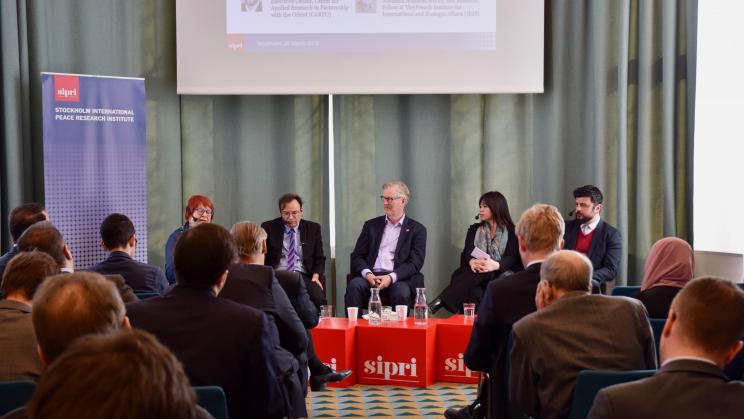
On 28 March, SIPRI convened a panel of experts to discuss the fate of the Iran nuclear deal – formally known as the Joint Comprehensive Plan of Action (JCPOA) – in light of US President Donald J. Trump’s recent ultimatum to withdraw the United States from the accord.
The focus of the expert seminar, ‘The art of keeping a deal: Can Europe save the JCPOA?’ was on whether Europe can prevent the deal from unravelling.
The discussion – moderated by Dan Smith, SIPRI Director – included participation from a range of foreign policy experts from the European Union, Iran and the United States. Alongside Dr Tarja Cronberg, Distinguished Associate Fellow at SIPRI were Thierry Coville, Research Fellow at the French Institute for International and Strategic Affairs, Suzanne DiMaggio, President of the New America Foundation, Jan Eliasson, Chair of the SIPRI Governing Board and Adnan Tabatabai, Chief Executive Officer of the Center for Applied Research in Partnership with the Orient.
While observing the JCPOA as a positive achievement for diplomacy and non-proliferation, participants recognised that the situation was a major test for the European Union (EU) as a foreign policy actor and its strategic autonomy. The question of whether the EU would stand up to US sanctions if they are re-imposed was posited, alongside the level of unity among EU member states on such an action.
The point was made that the JCPOA was an accomplishment of a faction within Iran’s political establishment that says that outreach and diplomacy is the way forward, against the faction who advocate the paradigm of deterrence in dealing with the world—who would benefit if the JCPOA failed as a multilateral agreement.
Coverage of the event appeared in Dagens Industri and Tehran Times.
See below for a livestream of the event and a selection of photos.
About the JCPOA
The JCPOA, which was reached in 2015 by Iran, the EU/EU3+3 (the United States, China, Russia, the UK, France and Germany), ended the international crisis over Iran’s nuclear programme.
Although the International Atomic Energy Agency (IAEA) says that Iran is complying with the terms of the agreement, the USA wants the time-bound restrictions, or ‘sunset clauses’, on its nuclear programme to be made permanent. US President Donald Trump also wants to limit Tehran’s missile and regional activities as well as greater access to Iranian military sites. Unless Europe succeeds in negotiating a supplementary agreement addressing these issues, the US President has said he would no longer waive nuclear-related sanctions against Iran, as required by the JCPOA. The next sanctions waiver is due on 12 May.